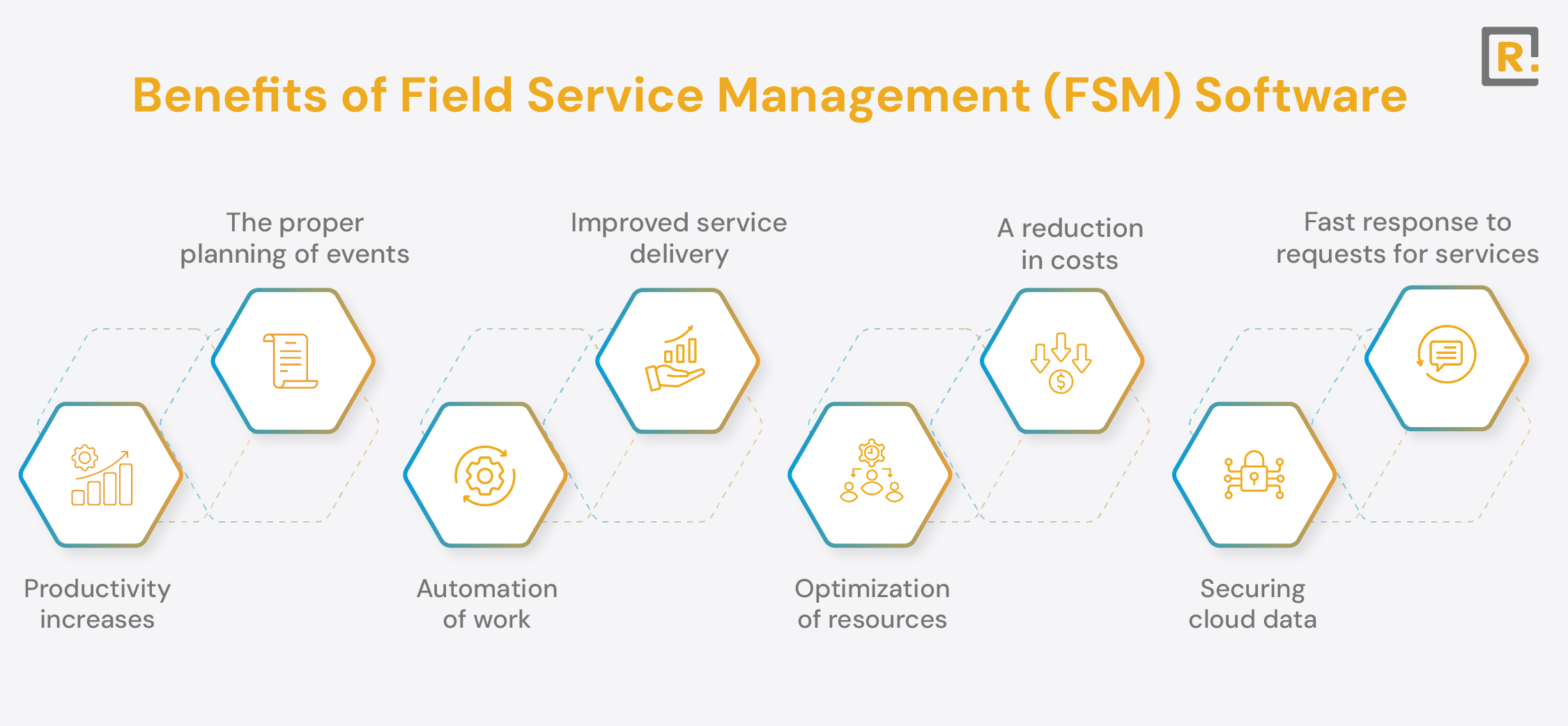-
Solutions
Vendor Management Efficient vendor management platformField Service Management Effective onsite service operationsReal Estate Management Efficient real estate managementAsset Management Efficient asset lifecycle managementDistribution Management System Optimized supply chain distributionDigital Retail Solution Integrated e-commerce solutionsSubscription and Billing System Automated billing and subscriptionsSales Force Automation Optimized sales process automationIntelligent Character Recognition Software Automated text conversion and data extraction
- Why Raapyd
- Insights
- About
Key Benefits of Field Service Management Software
- Professional Services
- Field Service Management

It is always expected of businesses that provide services at their clients’ sites to set up appointments as fast as possible, send bills on time, keep track of the work, and send the correct specialists with the right tools and equipment. Many managers find managing field services challenging, and field managers struggle to optimize worker efficiency with paper-based FSM. Businesses need specialized Field Service Management software to efficiently manage workers, tools, and other resources.
Unlike property management, field management involves the management of company resources used at or on the way to the client site. Work orders are organized, invoices are generated, specialists are sent out, and job status and labor hours are tracked. The field service industry includes client service, maintenance, repair, inspection, and consulting. In this article, the benefits of field service management software are clearly explained. However, let us first examine Field Service Management Software in more detail.
What is Field Service Management (FSM) Software?
A field service is any service in which workers are sent to clients’ sites to perform tasks. High-tech, HVAC, utility, and telecommunications companies, transportation companies, construction companies, and even consulting and medical enterprises tend to utilize this service. Field service management manages all aspects of field services, such as the issuance of work orders and invoices, the tracking of personnel and equipment, project scheduling, and routing optimization. The goal is to provide the best possible customer experience, which is achieved by being fast to respond, providing informed support, and identifying a solution—all while reducing expenses and turning a profit for the business.
Benefits of Field Service Management (FSM) Software
At the end of 2021, cloud-based field service management software generated $3.5 billion in revenue, an 18% increase over 2020, according to Gartner’s 2022 Magic Quadrant for Field Service Management. According to different research, revenue is expected to reach $5.7 billion by 2026. As more companies become aware of its many advantages, the market for field service management software is expanding. Among the features and benefits are:

Productivity increases
Leveraging FSM software to automate every process eliminates the need for office data entry, form completion, and log updating. Workers and technicians can perform their duties more effectively by devoting more time to their actual job profiles. Your workforce will be able to complete more daily tasks as a result of this time utilization, which will boost output and improve dispatch accuracy.
The proper planning of events
Field service providers encounter difficulties such as insufficient workflow and dispatching problems that result in schedule overlaps. You can assign projects to experts who are closer to your clients by using GPS. This enhances organizational order in addition to saving time. A real-time scheduling system allows field workers to make quick adjustments without delay. With today’s corporate advancements, remote work, for instance, has become essential to the construction sector. Managers, supervisors, and builders can collaborate on projects, exchange ideas, and even assign tasks without having to be there at the same time.
Automation of work
Field service management software automates many time-consuming, repetitive tasks that hinder a company’s ability to respond quickly to service requests and lead to operational inefficiencies. Management of work orders, scheduling and dispatching, route optimization, analytics and reporting, inventory control, and billing are among the tasks that can be automated. Field service management is seeing a rise in automation: According to Gartner, by 2025, almost two-thirds of field service work will be scheduled by bots and algorithms that are informed by machine learning, up from 25% in 2020.
Improved service delivery
Field service management software enhances service delivery in many ways, including automated work order management, faster problem-solving, and optimized scheduling. Customers are naturally happier and more likely to be retained at higher rates when work is done effectively and on time, which improves the company’s reputation. According to a 2022 analysis of customer service trends, 66% of firms worldwide stated that a positive customer service experience has favorably benefited their company’s growth, while 60% of enterprises reported that it promotes retention. 81% of consumers stated that a satisfying experience would make them more likely to make another purchase, and 70% said they had already done so.
Optimization of resources
Businesses are more profitable as a result of the field service management software since it effectively manages basic tasks, such as assigning and managing field workers based on their level of expertise. Source Refrigeration & HVAC’s field service management system, for example, uses a more impressive and useful approach in place of manual dispatch. Only one region has reduced its field technicians by 35% to maintain high service standards.
A reduction in costs
In addition to saving money, an FSM program generates income. By digitizing all documentation and coordinating forms in a single network, your team will be able to complete more tasks. Additionally, business users will be able to design forms and gather data on their own with the help of no-code field service management software. It makes processes more efficient and less dependent on IT. You can get more work, make more money, and take on additional work as a result.
Securing cloud data
Due to advanced encryption, cloud storage offers much greater security than on-site storage. Salesforce states that after moving to the cloud, more than 90% of companies reported improved security and easier time with compliance with legal guidelines. Management software can reduce risk and prevent security breaches if it has a business-specific security plan.
Fast response to requests for services
When it comes to client satisfaction, every second matters. According to a benchmark report about field service operations, 67% of field service leaders surveyed reported that businesses put a high priority on faster response times. The technicians closest to the clients’ locations are found using field service management software, which also makes sure that the proper technician (or team) is assigned to jobs based on the necessary skill set and their ability to travel the quickest route to the site. Even the ability to shift resources from one job to another with a higher priority is provided by field service management software.
Additional benefits of FSM that directly enhance productivity
Improve the efficiency of work order processing
Many companies still document on paper or record daily work order data using outdated software. This results in inaccurate data entry, dispatching issues, scheduling overlaps, delays, and costly demands. Every task, including the best routes to the site, equipment used, inventory management processing, client history, and service reports to give the client the best service possible, is sent to a worker’s mobile device using FSM software. It enables the company to efficiently streamline field service procedures in addition to doing away with paper-based ones.
Team coordination
Integrating FSM software solutions into your company helps improve team coordination. With this solution, team coordination is excellent. The customer’s manager will notify someone else to pick the assignment if the customer lacks FSM software. Once data validation is accessible on a common platform, managing it becomes considerably simpler. Therefore, field service software can improve the user experience by performing additional tasks and field operations to boost productivity, efficiency, and save costs.
A better approach to innovation
FSM systems use software/hardware, statistical data analysis, and employee and customer feedback to support continuous improvement. Identifying regions where services are lacking becomes easier when a system collects more data. Additionally, it’s simpler to estimate the time required to do a task, which helps with workforce planning. When feedback loops are implemented, processes will become more effective.
Why Choose Raapyd’s Field Service Management Software?
Customers don’t want to wait when they require on-site assistance. To ensure their satisfaction, Raapyd’s Field Service Management replaces traditional paper spreadsheet-based work with an automated solution that accelerates the process of scheduling and sending teams and technicians to customers’ locations based on availability, proximity, and expertise. The approach increases the first-time-fix rate by giving field workers access to all the information they need to do a job, hence increasing productivity. Proactive inventory management and operational analytics are other advantages of the program that help the company stay competitive, make better decisions, and enhance customer experience.
Conclusion
Software for field service management is essential for every company that responds to service requests. Field service management software makes sure that businesses are prepared to maximize their resources, satisfy their clients, and see results in their top and bottom lines. It does this by scheduling, deploying, and tracking workers in the field, giving them access to crucial data and analytics for decision-making, and automating time-consuming tasks so that staff can concentrate on more valuable work.
Discover More
Upgrade Your Field Operations With FSM
Automate job dispatching, monitor field activities, and boost technician productivity with
Raapyd’s Field Service Management Software.
